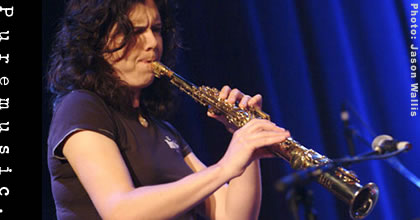
A Conversation with Maia Sharp
PM: So how are things lining up with your new label, Koch? It sounds like it started out with a decent album budget, anyway.
MS: I am really happy with Koch. Actually, the album budget--funny enough, I came in with a finished album. I started making this record for my last label, Concord.
PM: Right. Isn't that kind of a jazz label?
MS: Yeah, it is a jazz label, and that was a kind of hip factor, I thought, but it didn't serve the record at all.
PM: Yeah, it doesn't have a hip distribution, though.
MS: It doesn't have the hip radio factor, because they're not--
PM: They don't know anybody in AAA. [laughs]
MS: Right, they don't have experience in my genre. I was introducing them to people.
PM: That's not the way it's supposed to work...
MS: It's supposed to be the other way around, yeah. I mean, everybody over at Concord was really nice. And actually, we were going to make a second record anyway, because we had grown closer together, and we thought we had figured out how to make it work in my format. And just before I went into the studio, and I had already booked Brad, all the players, we had a schedule to finish a second record for them, they changed their whole office infrastructure. They got a new GM, they got rid of their radio person. They were going to get a new one in, but he wasn't in yet.
PM: What a nightmare.
MS: Yeah. It kind of fell apart. But now they're actually a better Triple A label, but the changeover happened right when I needed them. And so we parted, but the budget--the Concord budget--was low enough because they're a jazz label that I could go ahead and cover all of the bookings that I had already made. So we went ahead and finished the record. Then I came to Koch with a finished record.
PM: Good for you.
MS: They basically just reimbursed me for what I'd spent on it.
PM: So then did you license it to them, or it became their record?
MS: It's their record.
PM: Then they got a good deal, if they just reimbursed you, and they got a record out of it.
MS: Yeah. I don't want to spend a lot of my time being half of a label--
PM: [laughs]
MS: --which is what I think you have to do when you license a record.
PM: Ah, very interesting.
MS: I want them to take care of that stuff, so I can go write songs, so I can try to maintain the two hats of working the album and also flying out to Nashville four or five times a year, writing for a couple weeks at a time. I think if I had licensed the record, and I would have to come through with a lot of those traditional label responsibilities, I wouldn't have the time to go off and write like that. And that's my first love, so...
PM: That's interesting. I was interviewing Beth Nielsen Chapman yesterday, and I'm going to put both of you ladies on the cover.
MS: All right! Cool!
PM: You're both very savvy business people.
MS: Oh, thank you.
PM: It's educational for everybody who'll read it.
MS: Thank you.
PM: And as great as all three of the solo records are--because I had to go back and buy a bunch of music on iTunes because I just got hooked--you're even more distinguished by your many cuts now, and an unbelievably impressive list of co-writers.
MS: Well, thank you. Yeah, things are going well on the cut front.
PM: Among these many co-writers, who are your closest friends?
MS: Oh, wow...
PM: It's not asking, like "Who do you like to co-write with best," which is really a drag if somebody asks you that.
MS: Yeah.
PM: But some of them just become friends.
MS: I've become really good friends with Liz Rose.
PM: Ah.
MS: Stephanie Chapman. Let's see, hmm, Michael DeLaney. Yeah, Michael and I wrote "Something Wild" together.
PM: Oh, good. That was my next question. That's a fantastic song.
MS: Oh, thanks. It's gone over great live.
PM: Yeah. What a great core idea that song has, that it's wrong to touch something wild. Who came up with that beautiful idea?
MS: I came in with the title, "Something Wild." He came in with the groove. And we hammered out the rest of it from there.
PM: So the idea that maybe it's wrong to touch something wild just came out in the process?
MS: Yeah. I couldn't take full credit for that. I think we both found that together off of the title. And that cool minor pulsing groove that he walked in with.
PM: Right. So, yeah, I stopped you in the middle of running down who some of your closest friends were.
MS: I don't want it to sound cheesy, but I feel like most of my co-writers are really good friends. Kim Richey, we're close.
PM: She's amazing. [see our interview with Kim]
MS: We wrote "Red Dress" together. Kevin Fisher, he lives in L.A., but he does what I do, he goes out to Nashville four or five times a year. I think he goes even more than I do. He's not on the road for an album, so I think he's going out there more. We wrote "The Reminder" together. David Batteau and I are great friends. He lives in L.A. He doesn't do the Nashville thing. I'm going down the list of the tunes here. Co-writers that aren't on the record, Melissa Pierce, she's great.
PM: She's close?
MS: Yeah. She's a bud. continue
print (pdf) listen to clips puremusic home